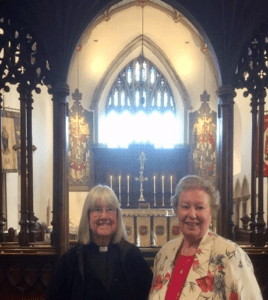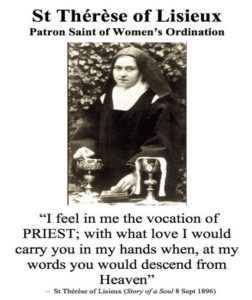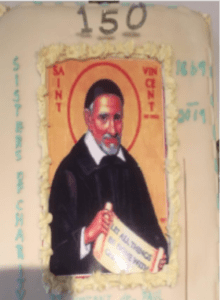The First Vincentian Woman Priest: Rev. Claire Lockhart Anglican Sister of Charity Ordained Priest; Durham, 1994. United Kingdom

“In Christ there is no Jew or Greek, slave or citizen, male or female. All are one in Christ Jesus” Galatians 3:28


On the Eve of the Feast of St Vincent, September 26, 2019, two miles from where the Mayflower ship departed for the USA in 1620, Plymouth Harbour, UK we celebrated the 150th Anniversary of the Anglican Sisters of Charity – a branch of the Vincentian Family. One of the Sisters is an ordained Minister of the Anglican Church of England (C of E); Reverend Claire Lockhart.
Reverend Claire is our first woman priest in the Vincentian Family.
Claire leads the parish of St Peter’s on the Isle of Lewis, Scotland (http://www.argyll.anglican.org/wp-content/uploads/2013/06/St-Peters- profile.pdf ) – the same “Western Isles” that St. Vincent sent two Gaelic speaking Irish Congregation of the Mission priests, Duggan and White, in 1654 to rescue the Catholic islanders from the aftermath of the Protestant Reformation. One wonders if Vincent’s avowed belief in reading the signs of the times would see him today smiling and nodding in agreement with Claire’s belief that her ministry as a woman priest is strengthened by her strong central Vincentian charism.
Today, 5,690 women priests in the C of E minister in a variety of ways including parishes and chaplaincies, more in the Church of Ireland, the Scottish Episcopal Church, The Church in Wales and of course the Anglican Communion. The present Anglican Bishop of London, installed in 2018, is former nurse Sarah Mullally, married with two children.
Rev. Claire told me: “The consecrated religious life is part of the outworking of my baptismal vocation. The call to priesthood came later. As I worked as a hospital chaplain I felt a deep need to offer the pain and suffering of people ‘on the altar.’ I was influenced by the writings of St. Therese of Lisieux and a book by Dom Columba Marmion, Christ the Life of the Priest. In a way I also made the connection through the dual nature of the Vincentian Charism. As Vincent and Louise de Marillac broke new ground in sending out young women into active ministry beyond the cloister, I think it not impossible that he would understand and promote the idea of women clergy.”
My own vocation is to lay family life, living the Vincentian charism, speaking truth to power, as an activist for social justice. I write to advocate ordination for those women who discern priesthood as their vocation. Like Sr. Joan Chissiter, OSB, I “came to feminism through faith.”


I am not the first or last Vincentian to do so. In 2008, Sr. Louise Lears, a Sister of Charity of Cincinnati was banned from all church ministries in St. Louis Missouri by Archbishop Raymond Burke because she had attended a women’s ordination ceremony. The same Archbishop is actively rebelling against Pope Francis humanitarian and radical transformation of our Church. (Ref. Global Sisters Report (GSR))
Mercy Sr. Theresa Kane, president of the Leadership Conference of Women Religious, addresses Pope John Paul II on Oct. 7, 1979, at the Basilica of the National Shrine of the Immaculate Conception in Washington during the pope’s visit to the United States. (Courtesy of the Leadership Conference of Women Religious)
“Our contemplation leads us to state that the church in its struggle to be faithful to its call for reverence and dignity for all persons must respond by providing the possibility of women as persons being included in all ministries of our church. I urge you, Your Holiness, to be open to and respond to the voices coming from the women of this country who are desirous of serving in and through the church as fully participating members.”
Just days before, in an address to an audience of vowed religious men and women in Philadelphia, John Paul had reaffirmed the ban on women priests, saying that an all-male priesthood “was the way that God had chosen to shepherd his flock.” (GSR).
There is no theological basis for a male-only priesthood.
There were no priests in Jesus’ time. There were male apostles, living their lives as we do in apostolic service of the most vulnerable in society.

In 2019, the Pope appointed several lay women and leaders of Religious Orders to The Congregation for Institutes of Consecrated Life and Societies of Apostolic Life. Vincentian, Sr. Kathleen Appler, Daughters of Charity is among them. Despite its title, this body had been previously male only. (https://www.globalsistersreport.org/news/trends/pope-names- women-full-members-congregation-religious-56320)
- Should we be content that the door to women’s involvement in Church leadership is open a little?
- What can we do to push that door harder for women’s talents and attributes be fully utilized for the benefit of all?
After all – we quote as our central Vincentian charism – ‘Humankind was created as God’s reflection: in the divine image God created them, female and male, God made them.’ Genesis 1:27
 Dee Mansi is a lay member of AIC, Vincentian Collaboration Commission, Vincentian Family Executive Committee & Depaul Assembly; a retired School Principal, Schools Inspector and Leadership in Education Lecturer. Dee is Irish, living in London with her husband and son, she travels in Europe and beyond.
Dee Mansi is a lay member of AIC, Vincentian Collaboration Commission, Vincentian Family Executive Committee & Depaul Assembly; a retired School Principal, Schools Inspector and Leadership in Education Lecturer. Dee is Irish, living in London with her husband and son, she travels in Europe and beyond.
Opinions expressed are the author’s own views.





The current teaching of the Roman Catholic Church is expressed:
CIC 1577 “Only a baptized man (vir) validly receives sacred ordination.”66 The Lord Jesus chose men (viri) to form the college of the twelve apostles, and the apostles did the same when they chose collaborators to succeed them in their ministry.67 The college of bishops, with whom the priests are united in the priesthood, makes the college of the twelve an ever-present and ever-active reality until Christ’s return. The Church recognizes herself to be bound by this choice made by the Lord himself. For this reason the ordination of women is not possible.68
In 1994 Pope St. John Paul II taught that this doctrine is to be “definitively held” by all the faithful, although the question has been constantly raised. (see https://www.traditioninaction.org/HotTopics/d014_Schonborn.htm)
Dee writes:
“My own vocation is to lay family life, living the Vincentian charism, speaking truth to power, as an activist for social justice. I write to advocate ordination for those women who discern priesthood as their vocation.”(Dee Mansi)
On discernment as a dialogue between the individual and the Church, both Roman Catholic and Anglican traditions recognize why a divine and ecclesial dialogue is so necessary, for “in the present context there is . . . a certain tendency to view the bond between human beings and God in an individualistic and self-centered way, as if God’s call reached the individual by a direct route, without in any way passing through the community” (Pastores dabo vobis, 37).”
This discernment in the Anglican Church admits of the possibility of women as candidates for ordination. In the Roman Catholic Church, it does not. The constant teaching of the Church on any issue that affects its sacraments is, in fact, a theological reason. This has had profound effects in the continuing Anglican-Catholic dialogues. (See https://iarccum.org/doc/?d=721)
And so, here we are, with many areas of the world without weekly Eucharist – the “fount and apex of the whole Christian life (Lumen Gentium 11).”
The “Vincentian question”: What must be done?
Congratulation to Rev. Sr. Mansi. May the good Lord bless you abundantly with wisdom and knowledge to do HIS work.
I don’t pretend to answer the Vincentian question. But allow me to submit, with Jim Claffey, that clericalism must go. And it must give way to: “Do nothing out of selfishness or out of vainglory; rather, humbly regard others as more important than yourselves, each looking out not for his own interests, but … for those of others” (Phil 2, 3-4).
Try as hard as those afflicted with clericalism to kick out the Spirit from the Church, this dynamic element in the Church will surely guide servants in discernment; It will bring them “consolación sin causa.”